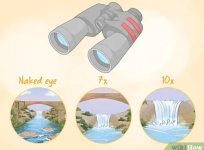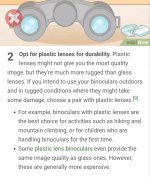Can you recommend a website, book, or other who asks, before deciding the best binoculars:
-what do you want to observe (small birds, big game, stars, buildings, ...)
-how far (20m, 200m, 500m, 1 zillions km...)
-light conditions (harsh light, dim light, twilight, ...)
How a binocular can be the best for different situations? In the opinion of a lot of web sites.
Basically any binocular observation book should be useful in that regard.
Even within certain areas of "binocular use" there are huge differences.
Astronomy -- depends on the quality of your sky, the objects you want to observe, etc. But in general -- better skies mean, you can use larger exit pupils as there is less light pollution and larger magnification leads to more shaking, so either a tripod becomes necessary past 10x or maybe 12x maximum or you need to go down in magnification.
For my purposes an EWA 7x35 is my preferred instrument.
For small birds -- large FoV if you wanna watch them in flight and choose magnification depending on most common distance to target.
For buildings -- little to no pincusion distortion would be preferrable, so don't use an old wide angle porro with tons of pincushion. I prefer either smaller FoVs for that type of use, where pincushion is less obvious sometimes or a bino that has low pincushion in general. Maybe a Komz BPO 7x30 even though I never used it specifically for that purpose. Favourite for sightseeing in cities is one of my skeleton binos in 8x20.
Lighting conditions: Harsh light -- smaller exit pupil or even models that have a slight tint to the image, like the UV-filtering military binos I own.
Dim light/twilight -- larger exit pupil, like a 10x56 for example. Also -- the UV-filtering models come in handy in twilight since they give a more natural view under those conditions. There is a reason, we call it "blue hour". Filter out the blue spectrum and colors become more natural in twilight.
Regarding the "best in all situations" then a 8x42 might come to mind. Bright enough for most situations, not too large or heavy, not too specialized.
But many swear by 10x magnification claiming 8x is not enough for their purposes, so once again, not really easy to make a general recommendation.
I'd have a hard time choosing between my DDoptics 10x45 with AK-prisms or my Fuji HC 8x42 for my personal best all-around bino. If in doubt, I think I'd go for more magnification, so 10x45 it is.
My "sweetspot" for binos is somewhere in the 6.5x32, 7x35, 8x32, 8x42, 10x42/45 area. Everything outside that range is for me too specialized in one or another area.











